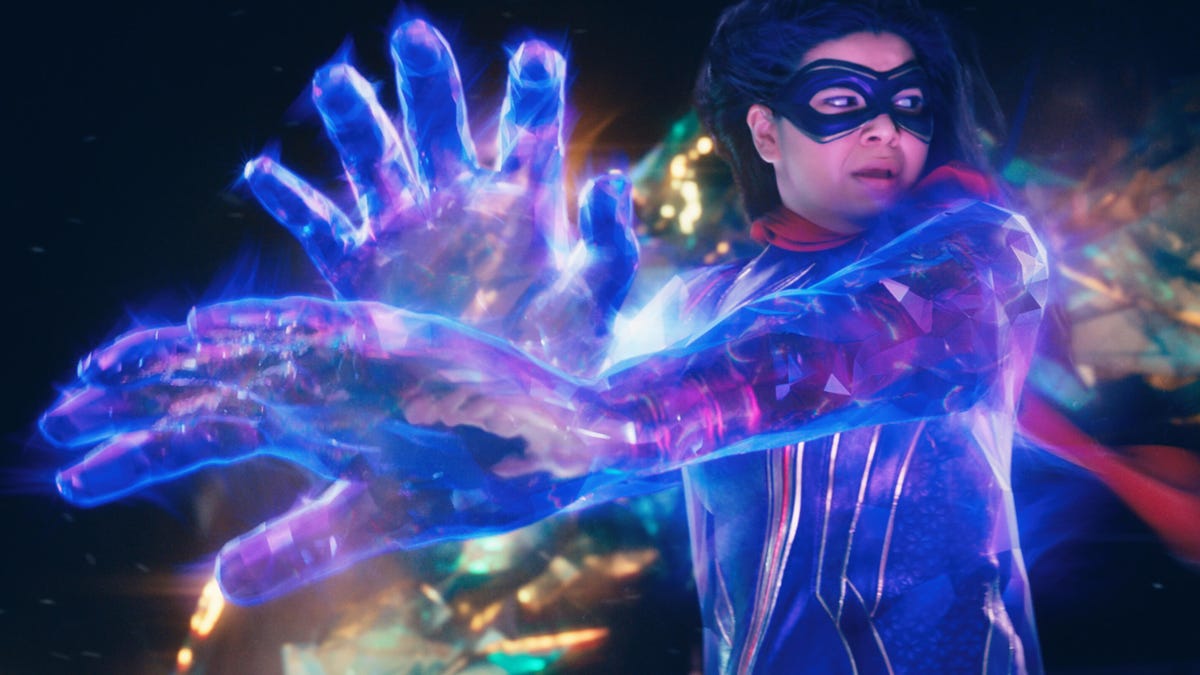'Ms. Marvel' Creators Talk Identity, Culture and That Surprise Ending
"Along the way people are learning so much about our faith and our culture," says executive producer Sana Amanat.

Kamala's powers coming to life.
Warning: spoilers ahead.
At the end of the fourth episode of Ms. Marvel, Kamala Khan is suddenly transported back in time to a chaotic train station. Swarms of people push past each other through billowing smoke to board overcrowded trains destined for Karachi. Friends and family hold back tears as they say their final goodbyes.
The scene depicts the tumult of Partition, the historical event in 1947 that divided British India into two countries: India and Pakistan. It's something you'd expect to see in a historical film or show -- less so in a Marvel superhero series on Disney Plus. But throughout the show, Partition is referenced repeatedly by Kamala's family, establishing it as a formative piece of each of their identities.
"When you're telling Kamala's origin story, what does that actually mean if you're not including the story of Partition, the story of families being torn apart?" executive producer Sana Amanat told CNET during a press junket Wednesday. Amanat was involved in the show after co-creating the original comic book character. Bisha K. Ali is the show's creator.
The scene is one instance of identity and culture taking center stage in Ms. Marvel, which aired its sixth and final episode on Wednesday. The show follows Kamala, a Pakistani-Muslim-American teen juggling different facets of her identity while discovering she has cosmic powers tracing back to her great-grandmother. In a slight departure from the original comic book series, Kamala's powers are passed down through her mother's family line and focused via a magical bracelet.
Amanat says this adaptation is one of her favorite aspects of the series.
"The strength in who you are comes from where you're from and where you've been," she said.
The importance of identity is seen in the countless cultural and religious references through the series, like the sprinkling of Islamic phrases such as "bismillah" (in the name of God) and "assalamu alaikum" (peace be onto you). Viewers get an inside look at everything from mosque politics to Eid celebrations.
"Along the way people are learning so much about our faith and our culture, and that has always been the hope," Amanat said. "But we're not trying to go in and be like, 'Hey guys, let's read about being Muslim.' That's not the point."
The point, according to executive producers Adil El Arbi and Bilall Fallah, is to show just how relatable and universal Kamala's story is -- aside from the superpowers, of course. In the end, she's just an awkward, confused teenager trying to figure out her place in the world.
"You don't need to be a Muslim girl from Jersey to appreciate that character," El Arbi said.
In creating the look and feel of the show, El Arbi and Fallah were inspired by the animation style of Spider-Man: Into the Spider-Verse. Those colorful touches can be seen in the text messages that flash in neon storefront signs, or in the animations of Marvel characters that appear on the sides of buildings as Kamala and best friend Bruno discuss her costume for AvengerCon.
"We love the colorful vibrancy of the comic books, so we really wanted to capture that," Fallah said. "We really also wanted to get inside of Kamala's head and show her fantasy world."
By the finale, Kamala forms a closer relationship with her mother.
And then there's that cliffhanger of an ending in the series finale. The science-savvy Bruno tells Kamala he analyzed her genetic makeup, and discovered she's not like the rest of her family.
"There's something different in your genes," he says. "Like a mutation."
This word hints at the X-Men (along with a musical sting from their '90s animated series), as Marvel has long teased the arrival of the mutant superteam. This would make Kamala the first confirmed mutant to appear in the mainline MCU.
"I'm personally very excited that we used that terminology," Amanat said. "It's something that I was hoping we'd be able to do and we did it."
But it's still anyone's guess what exactly that could mean next for Ms. Marvel.
"There's a lot of different ways it could go," Amanat continued. "It is important, and ultimately at the same time, it's not. … We're trying to do this entire thing about how we should not be defining ourselves based on these labels, so we didn't want to put too much weight on it."
Kamala brushes off this revelation in the show, too. After Bruno shares his discovery, she lets out a deep sigh and says, "Whatever it is, it's just gonna be another label." Viewers hear this dismissal and know it's not only in reference to the mutation, but to every other aspect of Kamala's life.
Regardless of viewers' own backgrounds, there's room to connect with Kamala. Beyond her religious and cultural identity and her superpowers, there's a relatable teenager who's learning more each day about herself and the world. That, Amanat says, is what makes the show resonate with so many people.
"It's not just about being Muslim, it's about trying to understand yourself and navigating all of these different aspects of your identity," Amanat said. "I don't think that's just the minority experience. I think it's a lot of different experiences, and that's why ultimately people connect with it."

